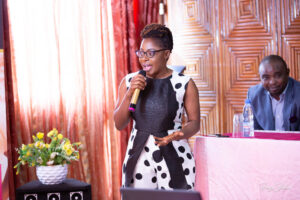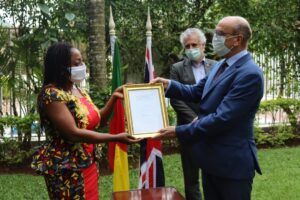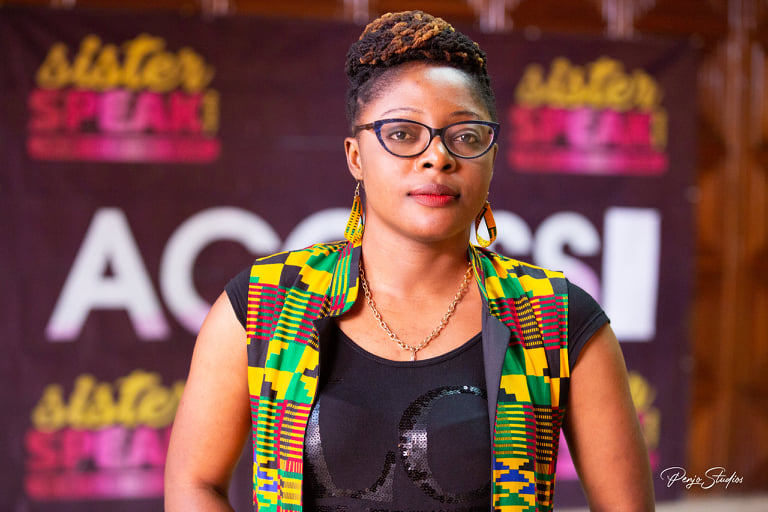She started off as a radio journalist thirteen years ago. By dint of intentional career development planning and mastery of relevant skills, Comfort (Commy) Mussa has become multiple award-winning multimedia journalist through her work with local and international media organisations in Cameroon.
Mussa, an impactful social worker and gender advocate whose was recently honoured by Her Majesty the Queen of England in this online interview with Lekan Otufodunrin, speaks about her amazing career, driving force and how to excel in the profession.
In your October 30 post on facebook, you wrote about having a fulfilling session as a trainer for Network for Solidarity Empowerment and Transformation for All workshop for 40 journalists from 5 regions of Cameroon. What does it take to be a media trainer and how fulfilling has it been over the years?
Being a media trainer is not an entry-level job, one needs to gain professional experience first. In addition to knowledge of the media and professional experience, the ability to share this knowledge in a way that resonates with the other colleagues/trainees is very important.
Been a media trainer has been very fulfilling especially when I get feedback from younger colleagues who write months or years after a training session to tell me how a particular training impacted them and improved how they do their work.
I get such feedback a lot and it’s deeply fulfilling to know that through training others, I can influence their work so profoundly
You also wrote about believing that journalism (done right) is at the heart of positive change, how can journalists harness this power to make the society better?
A good place to start is to be clear about the purpose of journalism and why we tell the stories we do. When the purpose is not known abuse is inevitable – that’s why I said journalism done right, which means there is a wrong way that some people are going about it.
Journalism has the power to spur change. If we do our work with high ethical standards, accurately reporting the facts, remaining impartial, and staying committed to the truth, readers will trust the information we share and use the information to make informed choices.

There are general complaints about the standard of journalism practice compared with the past years before the digital age. How will you describe the standard in your country and what needs to be done to enhance it?
The situation is similar in Cameroon, there are general complaints about the standard of journalism in this digital age. Many trained journalists and professional media organisations have been slow to embrace the digital revolution.
On the other hand, many untrained persons are passing for journalists online. The digital age with all its blessings and ‘wahalas’ are here to stay. Professional journalists should embrace it and make the most of the opportunities that the age offers journalism/journalists. This is the time when we should be witnessing the best standards of journalism because of the speed and amazing tools available to journalists at this age.
What has your media career experience being like considering your various roles in Communication, photojournalism, advocacy & media relations work over the years?
My career has been an amazing journey over the years and I am excited about the future. I started off as a radio journalist 13 years ago and over the years I’ve gone through various roles in different companies.
I am intentional about my career path I always have a career development plan (both long term and short term) and I set goals including which new skills I want to learn. This keeps me learning and innovating. Changing roles and learning new skills brings constant newness and excitement to my career experience.
What major steps have you taken to enhance your capacity on the job to be able to switch to different aspects of media work?
Defining my purpose and being intentional about what I want to achieve as a journalist set the foundation for me. I always evaluate my career development plans and set goals in line with my purpose of being a journalist.
These evaluations help me see where there are gaps, where I need further training or coaching etc. and I take the necessary steps to improve.
How disadvantaged are women journalists in your country and what needs to be done to ensure gender equity?
The marketplace is fairly and anyone can become a journalist irrespective of their gender. However, women are very few in management positions in most media organisations in Cameroon. Also, across the board, fewer women cover politics and sports and other topics that have traditionally been the niches of male journalists.
To ensure gender equity, more women should be appointed for leadership positions. Women should not shy away from coverage of politics or sports or any other topic that piques their interest. In Cameroon, there are different networks and support groups where female journalists come together and exchange notes and share strategies on how they can be the best at what they do and ensure gender equity in the corps.
Share with me some of your memorable experience on the job, especially reports you have done that has caused the kind of change you want?
There are many memorable experiences and I can’t name all here. I am grateful for all the experiences. I fondly remember the time (early career days) when my radio reports led to the uncovering of the theft of a child. When the police found the baby, they invited me to see and hug the baby and thanked me for my work. Seeing a mother recover her missing baby was heartwarming.
For several years I co-hosted a sex and reproductive health radio show and on many occasions, I had listeners who would call or even come to the office to thank me for breaking the silence on topics like living with HIV, backstreet abortions etc.
Their personal stories of how the program helped them always blessed me. For over a year after the show went off the air, some listeners kept writing requesting that we continue because it had become their source for SRH news and support. I could go on and on – the experience and memories encourage me to do more and better.
What skills do journalists need to cope with the digital and economic disruptions of media practice as it used to be?
Things are changing rapidly in this age, to cope, for me the biggest skill is to stay curious and never stop learning. This will make you adaptable and marketable.
What is the driving force behind SistersSpeak and other initiatives you have championed?
Our driving force is our mandate to strengthen the leadership, power, and amplify voices of women and girls from disadvantaged communities and develop them into self-reliant and socially conscious leaders.
Over the last couple of years, we have successfully led very high impact initiatives amongst which are: Cameroon’s first inclusive fashion show, several media workshops for female journalists, National Access to Work program for women with disabilities, National Story Telling competitions for journalists.
Most recently we carried out a disability-inclusive COVID response project in seven regions of the country – this project earned us the Commonwealth Points of Light Award from Her Majesty the Queen of England.

You mentioned having a burden of untold stories in Cameroon. What are the stories you want the media to pay more attention to about your country?
At the moment the biggest story I will like the media to pay more attention to is the war in the Northwest and SouthWest Regions of Cameroon
What do you think of journalism practice in Nigeria and what advice do you have for journalists in the country?
Some years ago, some colleagues and I came to Nigeria for an exchange visit with Nigerian Union of Journalists and I was impressed at the infrastructure of media houses that we visited, the solidarity between local journalists and the strength of the private press in Nigeria.
The grass definitely seemed greener. I don’t have as much access to Nigerian newspapers as I do their web publications and television stations. Based on what I see, I can only advice the younger colleagues that the purpose of journalism is not to be famous or get facebook likes, it is way bigger than that.
How well can journalists in the continent collaborate to enhance the practice of the profession in Africa?
Across the continent, there are many networks and associations for journalists. These are great platforms to exchange notes, tap into the expertise of colleagues from different countries.
Collaborative journalism projects between colleagues in different countries can also enhance the practice of the profession in Africa.


“Many trained journalists and professional media houses…have been slow to embrace the digital revolution”. Giving room for “untrained persons to pass online as journalists”.
Thank you Commy for hitting this hard. How I pray that this interview and other training sessions will contaminate every “media professional” in CMR
You are not my role model for nothing.
Yes the paragraph to younger ones got me well. It is not about likes and all but true impact. Thanks so much